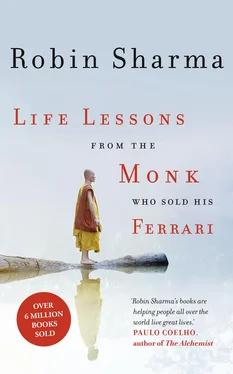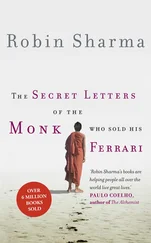9.
Learn to Say No Gracefully
It is easy to say yes to every request on your time when the priorities of your life are unclear. When your days are not guided by a rich and inspiring vision for your future, a clear image of an end result that will help you act more intentionally, it is not hard for the agendas of those around you to dictate your actions. As I wrote in Leadership Wisdom from The Monk Who Sold His Ferrari , ‘if your priorities don’t get scheduled into your planner, other people’s priorities will get put into your planner.’ The solution is to be clear about your life’s highest objectives and then to learn to say no with grace.
The Chinese sage Chuang-tzu told the story of a man who forged swords for a maharaja. Even at the age of ninety, his work was carried out with exceptional precision and ability. No matter how rushed he was, he never made even the slightest slip. One day, the maharaja asked the old man, ‘Is this a natural talent or is there some special technique that you use to create your remarkable results?’ ‘It is concentration on the essentials,’ replied the sword-crafter. ‘I took to forging swords when I was twenty-one years old. I did not care about anything else. If it was not a sword, I did not look at it or pay any attention to it. Forging swords became my passion and my purpose. I took all the energy that I did not give in other directions and put it in the direction of my art. This is the secret to my mastery.’
The most effective people concentrate on their ‘areas of excellence’, that is, on the things they do best and on those high-impact activities that will advance their lifework. In being so consumed by the important things, they find it easy to say no to the less-than-worthy distractions that clamor for their attention. Michael Jordan, the best basketball player in the game’s history, did not negotiate his contracts, design his uniforms and prepare his travel schedules. He focused his time and energies on what he did best: playing basketball, and delegated everything else to his handlers. Jazz great Louis Armstrong did not spend his time selling tickets to his shows and setting up chairs for the audience. He concentrated on his point of brilliance: playing the trumpet. Learning to say no to the non-essentials will give you more time to devote to the things that have the power to truly improve the way you live and help you leave the legacy you know in your heart you are destined to leave.
10.
Take a Weekly Sabbatical
In ancient days, the seventh day of the week was known as the Sabbath. Reserved for some of life’s most important yet commonly neglected pursuits, including spending time with one’s family and hours in deep reflection and self-renewal, it provided a chance for hard-working people to renew their batteries and spend a day living life more fully. However, as the pace of life quickened and more activities began to compete for people’s attention, this wonderful tradition was lost along with the tremendous personal benefits that flowed from it.
Stress itself is not a bad thing. It can often help us perform at our best, expand beyond our limits and achieve things that would otherwise astonish us. Just ask any elite athlete. The real problem lies in the fact that in this age of global anxiety we do not get enough relief from stress. So to revitalize yourself and nourish the deepest part of you, plan for a weekly period of peace – a weekly sabbatical – to get back to the simpler pleasures of life, pleasures that you may have given up as your days grew busier and your life more complex. Bringing this simple ritual into your weeks will help you reduce stress, connect with your more creative side and feel far happier in every role of your life.
Your weekly sabbatical does not have to last a full day. All you need are a few hours alone, perhaps on a quiet Sunday morning, when you can spend some time doing the things you love to do the most. Ideas include spending time in your favorite bookstore, watching the sun rise, taking a solitary walk along a beach and writing in your journal. Organizing your life so that you get to do more of the things you love to do is one of the first steps to life improvement. Who cares if others don’t understand what you are trying to accomplish by making the weekly sabbatical an essential part of your life. Do it for yourself, you are worth it. In the words of Thoreau, ‘If a man does not keep pace with his companions, perhaps it is because he hears a different drummer. Let him step to the music which he hears, however measured or far away.’
Years ago, when I was a litigation lawyer who had many of the material trappings of success yet little in the way of inner peace, I read a book called As a Man Thinketh by James Allen. The book discussed the enormous power of the human mind to shape our reality and attract great happiness and prosperity into our lives. The work also mentioned the profound influence of the words and language we use on a daily basis to create a more enlightened pathway of thought.
Fascinated, I began to read more and more wisdom and self-help literature. And as I did, I discovered the profound impact and importance of the words we use in our daily communications (both with others and with ourselves) on the quality of our lives. This knowledge also caused me to become aware of the personal dialogue that each of us has going on within us every minute of every hour of every day and to vow to improve the content of what I was saying to myself. To achieve this, I began to apply a strategy developed by the ancient sages over five thousand years ago. And, in many ways, it changed my life.
The technique is a simple one and involves nothing more than selecting a phrase that you will train your mind to focus on at different times throughout the day until it begins to dominate your awareness and reshape the person you are. If it is inner peace and calm you seek, the phrase, known as a mantra, might be, ‘I am so grateful that I am a serene and tranquil person.’ If it is more confidence that you want, your mantra could be, ‘I am delighted that I am full of confidence and boundless courage.’ If it is material prosperity you are after, your saying might be, ‘I am so grateful that money and opportunity is flowing into my life.’
Repeat your mantras softly under your breath as you walk to work, as you wait in line or as you wash the dishes to fill otherwise unproductive times of your day with a powerful life improvement force. Try to say your personal phrase at least two hundred times a day for at least four weeks. The results will be profound as you take one giant step to finding the peace, prosperity and purpose your life requires. As Hazrat Inayat Khan said, ‘The words that enlighten the soul are more precious than jewels.’
12.
Schedule Worry Breaks
After I wrote The Monk Who Sold His Ferrari , I was flooded with letters from readers who saw their lives change from the lessons they discovered on becoming happier, more fulfilled and more peaceful in these stress-crazed times. Many of the letters came from people whose work lives had grown so busy that they spent most of their free time worrying about things that should have been left at the office. They had lost the ability to laugh, love and share joy with their families because challenges at work were consuming them.
Too many people are spending the best years of their lives stuck in a state of constant worry. They worry about their jobs, the bills, the environment and their kids. And yet we all know deep in our hearts that most of the things we worry about never happen. It’s like that great saying of Mark Twain’s, ‘I’ve had a lot of trouble in my life, some of which actually happened.’ My father, a particularly wise man who has had a deep influence on my own life, once told me that the Sanskrit character for funeral pyre is strikingly similar to the Sanskrit character for worry. ‘I’m surprised,’ I replied. ‘You shouldn’t be, son,’ he gently offered. ‘One burns the dead while the other burns the living.’
Читать дальше












